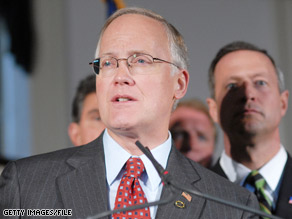
The Vermont Senate voted overwhelmingly Monday to legalize same-sex marriage, potentially setting the stage for a high-profile legislative showdown and breaking a new political barrier in the state that made history in 2000 by becoming the first to approve civil unions for gay and lesbian couples.
If the bill becomes law, Vermont will become the first state to legalize same-sex marriage without being forced to do so by the courts. The bill, which passed the 30-member chamber by a 26-4 margin, moves to the Vermont House, where it is also expected to be approved. Republican Gov. Jim Douglas, however, has said he doesn’t support the bill. “Gov. Douglas agrees with President Obama that marriage is between a man and a woman. He supports Vermont’s current civil union law, which provides equal rights, benefits and responsibilities to Vermonters in civil unions,” Douglas spokeswoman Dennise Casey said. He also “believes this bill is a distraction from the important work the Legislature needs to do to pass a responsible budget and get our economy going again,” Casey added. It is unclear whether both chambers of the Vermont Legislature would vote to override a potential gubernatorial veto.
Don’t Miss
Economy enters same-sex marriage debate
California court hears same-sex marriage arguments
Another Senate vote on the bill was set for Tuesday, but Monday’s vote was the main one, according to the Burlington Free Press newspaper. The House Judiciary Committee will start hearing testimony on the bill Tuesday afternoon, the newspaper said. Currently, only Massachusetts and Connecticut allow same-sex marriage. Vermont, New Hampshire and New Jersey allow civil unions for gay and lesbian couples. Vermont legalized civil unions nine years ago in response to a ruling from its high court. Nationwide, the issue of same-sex marriage remains highly divisive. A June 2008 CNN/Opinion Research Corp. poll found that 44 percent of adult Americans believe gay marriage should be recognized by law as valid; 53 percent are opposed. The issue took center stage in the nation’s largest state in November, when California voters narrowly approved a proposition amending the state constitution to ban same-sex marriage. California had been issuing marriage licenses to same-sex couples since a May 2008 ruling by the state Supreme Court legalized the unions. California’s high court heard arguments three weeks ago in a case tackling the constitutionality of the controversial ballot proposition. It has not yet issued a decision. The 1996 federal Defense of Marriage Act effectively bars the federal government from recognizing same-sex unions by defining marriage as “a legal union between one man and one woman as husband and wife” and a spouse as “a person of the opposite sex who is a husband or a wife.”